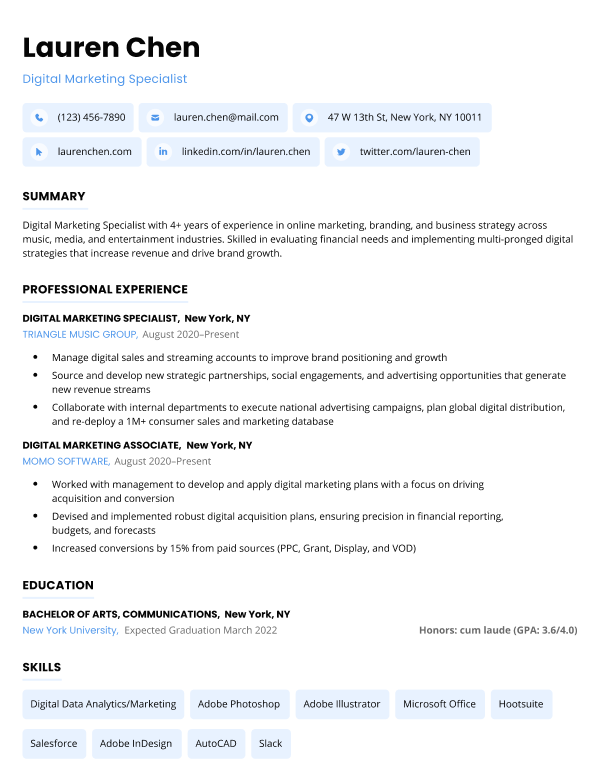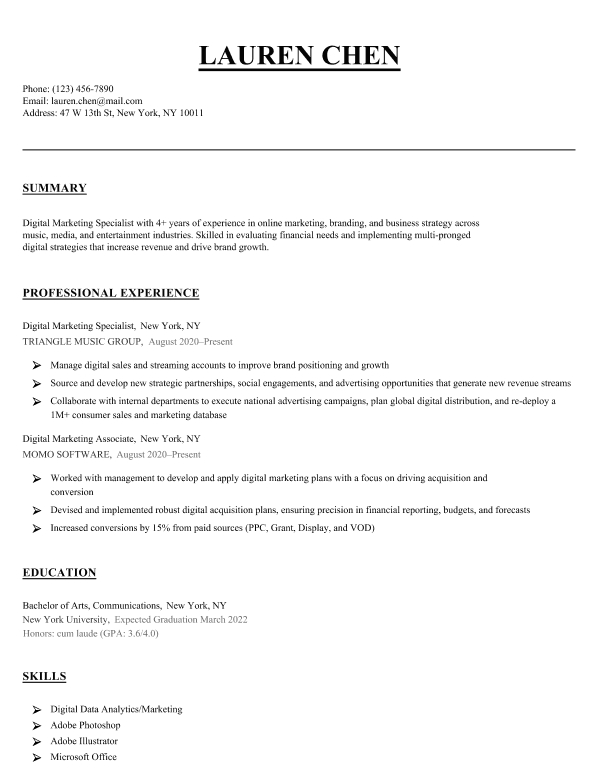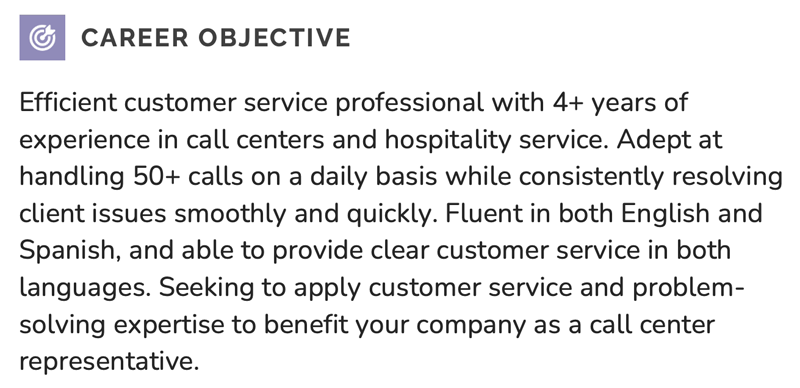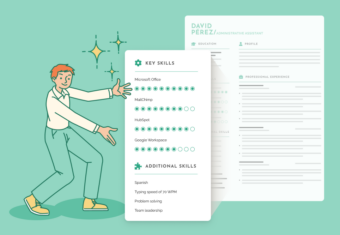Candidates with good people skills are highly sought after by employers because they’re more likely to work well in a team and be better suited to handle client interactions. This makes using the right people skills-related resume keywords throughout your application an important step when putting together your application documents.
In this article, we provide:
Our free-to-use resume builder can make you a resume in as little as 5 minutes. Just pick the template you want, and our software will format everything for you.
What are people skills? (definition)
People skills are a collection of personality traits and social skills that help you interact and communicate with other people effectively.
Similar to interpersonal skills, people skills refer to a variety of different traits that make you a good colleague and team member who contributes to a positive work environment.
Improving and maintaining your people skills is crucial because being able to interact with others (peers, clients, subordinates, managers) is a key part of most jobs, making it one of the best skills to put on your resume.
Even if you have the hard skills (i.e., technical skills acquired through training) necessary to perform well at a role, a lack of soft skills and social know-how may prevent you from advancing your career.
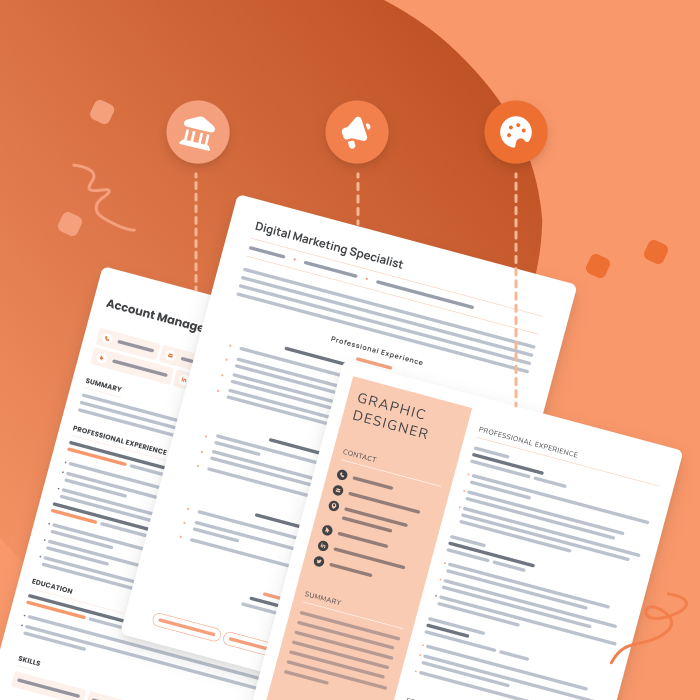
Resume examples for different industries
Not sure what your resume should look like? The best way to learn is by taking inspiration from resume examples written by other candidates in your industry.
28 people skills examples
We’ve compiled a long list of people skills examples for you to include on your resume and cover letter:
1. Communication skills
Communication skills are a vital part of having good people skills. Being a great communicator allows you to accurately convey information, pick up the relevant facts when listening to people, and give presentations to large groups.
Communication skills are so crucial that Inc.com named them the No. 1 soft skill that employees must have. Employees with effective verbal and non-verbal communication skills can explain complex ideas in a simple way and use their body language to get their point across, making them more effective in the workplace.
Here’s an example of how to highlight communication skills on a resume:
Acted as a liaison between the sales and marketing departments, facilitating seamless communication and collaboration
2. Conflict resolution
Conflict resolution involves acting as a neutral party when two or more people have a dispute. Being able to successfully resolve issues between people is important for many different jobs, especially those in customer service, HR, and management.
Additionally, conflict resolution is closely linked to calmness and level-headedness. Both are essential to understanding multiple sides of an argument and helping parties reach a mutually-beneficial compromise.
Here’s how you might showcase your conflict resolution skills:
Effectively managed and resolved conflicts with displeased customers, turning challenging situations into opportunities to strengthen customer relationships and increase repeat business
3. Negotiation skills
Being able to negotiate is an essential people skill — whether you’re asking for a raise, seeking a deadline extension on a difficult project, or negotiating a contract with a new client. Because every client is different, you must be able to understand their needs while keeping your company’s interests in mind too.
This example emphasizes the candidate’s negotiation skills:
Negotiated and closed complex contracts with key vendors, resulting in a 15% reduction in procurement costs and significant cost savings for the company
4. Patience
Working on a team or handling customers on a daily basis? Patience is a skill that will help you manage your stress levels and make workplace interactions run more smoothly.
By taking a step back, evaluating the situation, and empathizing with the other person, you’ll be better equipped to avoid workplace misunderstandings.
Here’s one example of how to effectively demonstrate your patience on your resume:
Maintained a patient and empathetic approach when working with students facing learning difficulties, resulting in noticeable improvements in their academic performance
5. Trustworthiness
Building trust takes time and effort. But, if you invest energy into establishing trust with people, you’ll notice they become more likely to listen to your opinions and take your ideas seriously.
Consistently acting with integrity and sincerity will help you become a trustworthy person in the eyes of your colleagues, someone they feel comfortable coming to for advice.
If you’re a manager, trust is especially important. If you’re not able to gain the trust of the people you manage, it’ll affect the performance of the entire team.
This bullet point shows the applicant is a trustworthy employee:
Handled sensitive client information with the utmost confidentiality, earning the trust of clients and maintaining a spotless record of data security
6. Empathy
Empathy is the ability to understand a situation from another person’s perspective. Although it’s a skill that comes more naturally to some people than others, it can be practiced.
Try to recognize your own biases. Don’t just listen to what another person has to say, but try to understand why they say it.
At work, empathy will help you relate to your coworkers and clients. It’s a skill that will make you better equipped to handle or even avoid situations that could arise due to miscommunication.
In this example, the candidate’s empathy shines through:
Adapted communication styles to connect with diverse audiences, demonstrating empathy toward individuals with varying backgrounds and perspectives achieve more effective and inclusive interactions
7. Active listening
Being a good listener involves more than just letting others speak without interrupting. Unlike a passive listener, someone with active listening skills gives the speaker their full attention. They pay attention to the points the speaker is making, and respond thoughtfully.
Active listening is an essential skill for the workplace. In a work setting you need to engage with other people’s ideas, whether that’s your boss giving you feedback or a colleague making suggestions for a project.
Here’s a good example of a bullet point that focuses on listening skills:
Actively listened to employee feedback and concerns, facilitating open and constructive discussions that contributed to a 15% increase in employee engagement
8. Responsive body language
Body language, if used effectively, is a great tool to both convey a message and build trust. Some studies have shown that body language makes up more than 50% of communication and is more important than the actual words said during a conversation.
If you’re aware of how your body language is interpreted by others and learn to use it to your advantage, you’ll become a more effective communicator.
Here’s an example of how to convey your knowledge of body language on your resume:
Interpreted client body language cues during sales meetings, allowing for more personalized and effective sales pitches
20 additional people skills:
- Self-confidence
- Collaboration skills
- Creative thinking
- Customer service skills
- Flexibility
- Persuasion skills
- Charisma
- Mediation
- Networking skills
- Conversation skills
- Social skills
- Teamwork skills
- Open-mindedness
- Humor
- Team-building skills
- Honesty
- Problem solving
- Patience
- Politeness
- Motivational skills
How to develop good people skills
You can develop good people skills naturally by taking part in social situations. Interacting with new people, networking, and getting to know your colleagues are all effective ways of improving your people skills.
There are also many resources available online that can help you hone your people skills:
- BusinessBalls.com — this site provides many training programs for soft skills, including people skills.
- DaleCarnegie.com — Dale Carnegie was the author of the influential book How to Win Friends and Influence People, and this website gives you similar tips.
Furthermore, there are resources available if your people skills are affected by health conditions, like social anxiety, which affects one in eight Americans:
- ScienceOfPeople — this page helps you understand what social anxiety is, as well as how to recognize and treat it.
- Joyable — this service provides web-based treatment for social anxiety. Web-based treatment has been proven effective and may be cheaper than seeing a therapist in person.
How to list people skills on your resume
To make sure your people skills get noticed by hiring managers, you should highlight them throughout your resume. This is especially important if the job ad contains people skills-related resume keywords.
These are words that describe the qualities the employer wants candidates to have, and you can usually find them in the job description of the job posting.
Some people skills synonyms you might come across are:
- Interpersonal skills
- Relational skills
- Social intelligence
- Emotional intelligence
- Social competence
- Social acumen
If you find any of these in the job ad, try to include them naturally throughout your resume (just be careful not to stuff your resume with keywords to avoid making it too repetitive).
Here’s how to draw attention to your people skills in different parts of your resume:
1. Mention your people skills in your resume objective
The information you put in your resume objective is the first thing a hiring manager will learn about you. If you’re applying for a job where customer interaction and teamwork will be a significant part of your day-to-day life, mention at least one of your people skills at the beginning of your resume.
Here’s a good example of how to write a resume that features people skills from the start:
2. Include people skills in the professional experience section
The work experience section of a resume is an ideal place to write in detail about the various skills and qualities that make you a good candidate for the position. It’s also an opportunity to prove to employers that you know how important people skills are in the workplace, and that you’re able to use them to benefit the company.
To incorporate people skills-related keywords into your work experience section effectively, provide evidence of those skills by including hard numbers. Here’s an example of how to quantify resume accomplishments achieved because of excellent people skills:
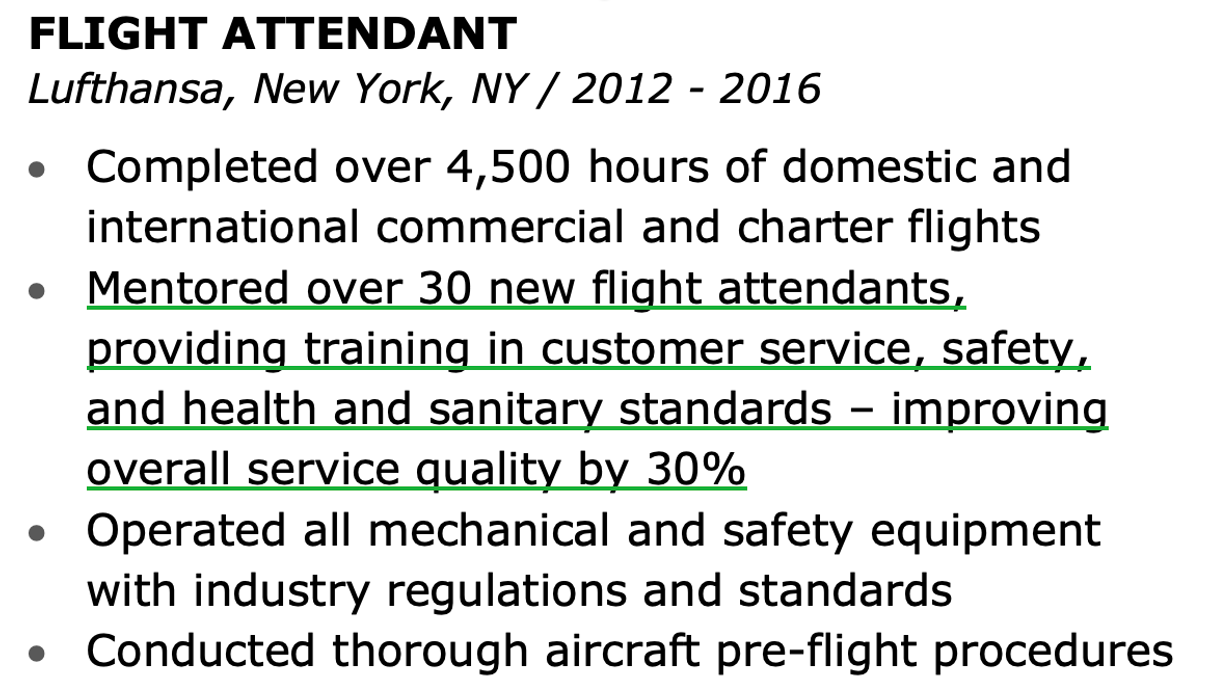
3. List people skills in the skills section of your resume
It’s most impactful to showcase your people skills in the resume objective or work experience section because you can highlight examples of these skills in action. However, if you run out of space or have additional people skills you’d like to highlight, you can include them in the skills section of your resume.
To make this section stand out, choose a resume template that allows you to display your skill level, like this one:
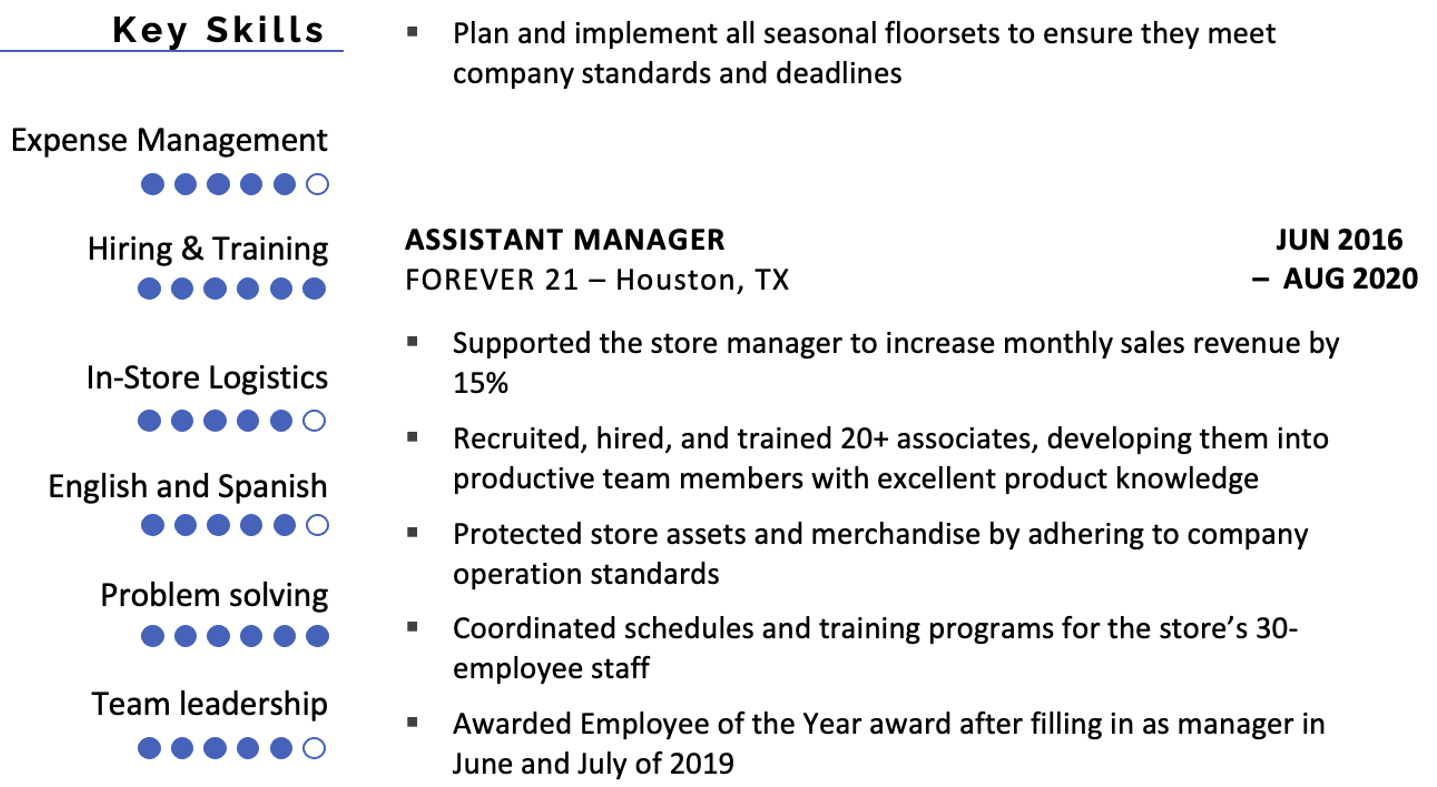
This resume template draws attention to your skills and allows you to rate them based on level of proficiency.
Additional skills-related resources
Here are some more skills-related resources for different industries:
Click to rate this article
4.4 Average rating



